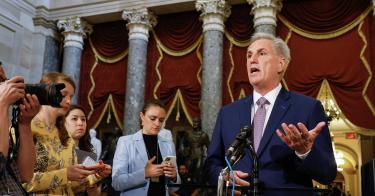House Speaker Kevin McCarthy, R-Calif., released text April 19 of legislation dubbed the Limit, Save, Grow Act. The bill, a focus of internal negotiations among House Republicans, would provide an increase in the federal debt ceiling lasting into next spring in exchange for a package of reforms aimed at lowering future deficits and boosting economic growth.
This approach of pairing debt ceiling increases with fiscally responsible reforms has public support, but Washington has an uneven track record of doing the right thing. In recent years, Congress has tended to punt and allow huge increases to the federal debt limit without any meaningful reforms.
Kicking the can down the road is exactly what Senate Majority Leader Chuck Schumer, R-N.Y., wants.
A “clean” debt limit increase such as Democrats seek would mean ignoring the stark reality of what America’s financial trajectory looks like:

McCarthy has criticized President Joe Biden for an unwillingness to negotiate a debt limit deal, which puts Biden to the left of former Presidents Bill Clinton and Barack Obama, both fellow Democrats. Even House Democrats are concerned about Biden’s approach.
Although there is no telling how the debt standoff drama will play out, it’s important to understand why House Republicans’ proposal would be an excellent step toward restoring fiscal sanity to the Washington swamp.
In turn, deficit reduction also would go a long way toward slowing the inflation that has punished hardworking families since the start of the Biden administration.
Bringing Spending Back to Earth, Repealing Unspent COVID-19 Cash
On the spending side, the most significant proposal in House Republicans’ Limit, Save, Grow Act is a reduction in discretionary spending, which covers most federal activity outside of major benefit programs.
The bill would reduce budget authority for fiscal year 2024 to the level of fiscal year 2022, then allow increases of 1% per year moving forward.
Although this might seem like a modest change—reverting to spending levels passed less than two years ago—it would lead to big savings.
That’s because Congress passed a bloated, pork-filled spending frenzy to cover fiscal year 2023, which began Oct. 1. Merely undoing the spending increases from that one-year period would save taxpayers $131.3 billion.
Holding spending growth to 1% per year, rather than the almost 9% growth in the last bill, would lead directly to even larger savings every year thereafter, as well as significantly reduced net interest costs.
The Congressional Budget Office estimates that this approach would save $3.2 trillion over a decade, or about $25,000 per household.
If Congress enacts a long-term discretionary spending limit, it’s vital for taxpayers to hold their representatives’ feet to the fire. The Budget Control Act of 2011 led to spending caps that saved hundreds of billions of dollars, but the caps eventually were undone in a series of bipartisan deals.
Americans must remember that members of Congress will not do the right thing with public funds unless they know that there will be consequences for irresponsibility. As the tea party movement waned, Washington’s big spenders went hog wild.
Another way the Republican savings package would address reckless spending is by rescinding leftover funds passed during the COVID-19 spending spree, saving tens of billions of dollars.
Ending Biden’s Student Loan Bailouts
The next-largest amount of savings in the Limit, Save, Grow Act, worth $460 billion, would target the Biden administration’s outrageous attempt to cancel student loan debt for those who haven’t felt like repaying what they owe.
This attempted power grab is politically corrupt, so unconstitutional that even then-House Speaker Nancy Pelosi said in 2021 that it would be illegal. It’s an insult to both those who repaid their student debt and to the tens of millions of taxpayers who never took out student loans in the first place.
The House package also would end the loan repayment pause that began in March 2020 as a result of the COVID-19 pandemic. Biden repeatedly has extended the pause, which now will last through June 30 even though the administration belatedly ended the national emergency two weeks ago.
Trading “Green New Deal” for Low-Cost American Energy
The Limit, Save, Grow Act includes two sections devoted to energy policy:
- Repeal of a swath of hyper-expensive “green” energy and electric vehicle tax credits passed by Democrats last year.
- The entirety of HR 1, the Lower Energy Costs Act, which the House passed March 30. It primarily serves to enable more domestic energy production by reforming outdated and cumbersome regulations that impose massive costs for minimal environmental effects.
Although the two sections are not explicitly linked, they flow from the same stream of thought.
Rather than using a mix of taxes, subsidies, and regulations to micromanage the nation’s energy and transportation sectors—the approach of Biden and other progressives—House Republicans would empower Americans to produce and consume energy in ways that best suit them.
This one-two punch has many benefits. It would help prevent energy dependence on China (which controls much of the supply chain for many “green” products such as batteries and rare minerals), grow the economy through increased energy production and lower energy prices, create hundreds of thousands of jobs, and reduce future deficits by hundreds of billions (or even trillions) of dollars.
These provisions would do more to combat inflation than anything Congress has done in decades.
Rescinding That Huge Funding Boost for IRS
The so-called Inflation Reduction Act of 2022 provided the Internal Revenue Service with almost $80 billion of supplemental funding through fiscal year 2031. These funds were in addition to the agency’s regular annual appropriations, which stood at $12.6 billion as of fiscal 2022.
The Limit, Save, Grow Act would rescind most of the unspent portion of the supplemental IRS funding, but would leave in place funding set aside for taxpayer services, business systems modernization (technology improvements), and agency oversight. The new House bill potentially would prevent IRS outlays of more than $45 billion on enforcement and nearly $25 billion on operations between fiscal 2024 and 2031.
The enforcement portion of the IRS funding was perhaps the most controversial element of the biggest tax-and-spend bill of 2022. Enforcement almost entirely consists of new audit examinations and collections.
Repeal of the extra IRS funding would save honest taxpayers in at least three ways, by: (1) reducing direct taxpayer funding to the IRS, (2) reducing the number of costly and time-consuming audits Americans face, and (3) lowering consumer prices by reducing company overhead, especially for small businesses that can ill afford to pay high-priced accountants and lawyers for tax and audit services.
On April 19, the IRS submitted a compendium of its strategic operating plan to the Senate Finance Committee, and that document shows that the IRS plans to amass an enormous enforcement apparatus, more than tripling its spending on enforcement from about $5.4 billion in 2022 to about $16.9 billion in 2031.
If IRS employees assigned to enforcement were to increase at the same rate as enforcement funding, that would allow the IRS to hire more than 76,000 more full-time employees in enforcement by 2031. If the IRS averaged 50 audits of households per year per new full-time employee in enforcement (less than one audit per week per new employee), that would mean 3.8 million additional audits in 2031 alone.
(Incidentally, fewer than 3.8 million American households reported adjusted gross income of greater than $400,000 as of 2020.)
The coming wave of new IRS audits would impose a huge cost on Americans, regardless of whether they themselves were selected for an audit. The $144.5 billion accounting industry would benefit, but everyday Americans would pay the price if labor and scarce resources were diverted from producing the goods and services they need and shifted to the IRS, accountants, and lawyers.
By constraining the IRS and freeing American workers and small businesses from excessive audits, the Limit, Save, Grow Act wouldn’t just save Americans money, it also would limit the expansion of government and grow the economy.
Work Requirements: Good for Welfare Recipients and Taxpayers
An aspect of the Limit, Save, Grow Act that is receiving outsize attention considering its budgetary impact is adding and strengthening work requirements for federal programs such as Medicaid and food stamps.
The estimated savings, in the neighborhood of $100 billion over a decade, are certainly helpful. However, what matters more is the beneficial effect that work requirements have in rescuing families from the trap of dependency on government.
Welfare reform made great strides in the 1990s by steering the able-bodied into the workforce, which in turn dramatically reduced poverty in single-parent households. Unfortunately, some of that progress has been lost in recent years, and millions of open jobs are available to adults who are languishing in the welfare system.
While the Left portrays work requirements as a harmful burden, keeping adults in the workforce actually has a variety of positive effects beyond improved household financials, including better mental and physical health. That means these reforms would be worth passing even if they didn’t reduce future deficits—which they do.
Protecting the Economy from Regulatory Strangulation
Although discussions about the federal budget typically focus on spending and taxes, Congress has another method to reduce long-term deficits: increasing economic growth by reducing burdensome regulations.
The Limit, Save, Grow Act contains the contents of the REINS (Regulations from the Executive in Need of Scrutiny) Act, a measure that would force presidential administrations to receive approval from Congress before implementing major regulations.
This would prevent administrations from abusing executive authority and also make it more difficult for Washington to entangle businesses in additional layers of red tape. Such protections are badly needed due to the radical bend of the Biden administration, which has pushed statutes to a breaking point in pursuit of increasing its control over the economy.
While the REINS Act is only one of many necessary actions Congress should take regarding regulation, it would help bolster economic growth, which in turn would help the nation’s bottom line.
Conclusion: This Can’t Wait
The debate over the debt limit is likely to take center stage in the coming months. Hopefully, Democrats will put aside demagoguery long enough to participate in good faith negotiations.
In the meantime, House and Senate Republicans must stand their ground and make it clear to the public that tackling Washington’s unsustainable, inflationary spending can’t wait.
This piece originally appeared in The Daily Signal



